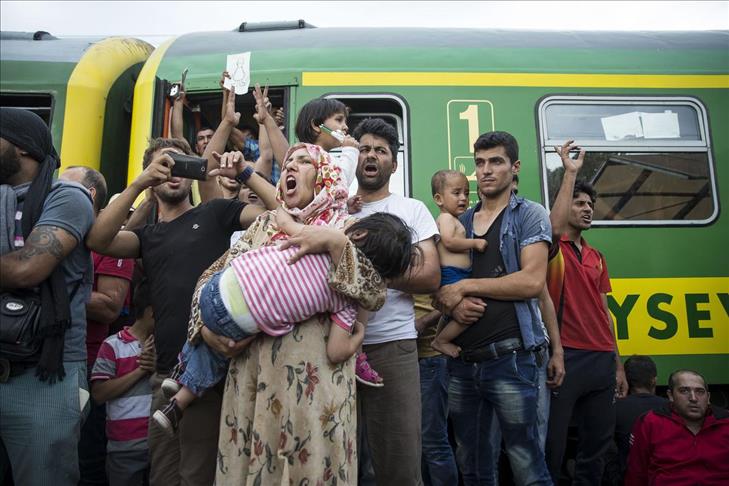Migrants should be treated according to needs: experts
Speaking at G20, experts on migration have called for better understanding on how migrants can be integrated

By Andrew Jay Rosenbaum
ANKARA
Migrants should be treated according to their needs, experts on migration at the G20 told Anadolu Agency.
"There is an immediate and pressing need for migrants to be understood, and integrated according to their needs into their destination countries," Victorine Piot Mensah, chair of the London-based migrants aid organization PIOT Foundation, said.
"With 350,000 migrants pressing at the borders of the European Union, measures should be taken to define different treatment for different types of migrants," agreed Lynn Shotwell, executive director of the Virginia-based Council for Global Migration.
Jean-Claude Juncker, the European Commission president, is calling for EU countries take in 160,000 migrants currently in Greece, Italy and Hungary -- that is four times the number proposed less than two months ago, Juncker's office said Thursday.
"But there is still no platform in any European country that provides sufficient support for migrants, nor are there useful legal distinctions between different types of migrants," Mensah said. "There are migrants who arrive legally seeking work, and there are highly-skilled migrants who could fit right in to European economies."
"For now, migrants are all lumped into one group," Shotwell explained. "And this puts legal migrants, and highly-skilled migrants at a disadvantage. Migrants valuable to their destination countries if they are treated in the right way, but this is not what is happening."
Shotwell said that proper training and education for the national authorities that deal with migrants would help to bring the challenge of increased migration under control.
"There is much that could be done to make the migration crisis into a valuable opportunity if the correct legal and administrative changes were to be made," Mensah said.
While experts call for distinguishing between skilled and unskilled migrants, Turkey has objected to such a policy, calling it akin to treating people "inhumanely".
"Some European countries classify immigrants according to qualifications, but that is not humane," President Recep Tayyip Erdogan told the G20 in capital Ankara on Thursday.
"The Western world has turned a cold shoulder to human criteria in regard to migrants. The values that make us human are drowning in the Mediterranean. It is humanity that is drowning in the Mediterranean; those responsible show no remorse or regret," Erdogan said.
Later, in an interview with CNN International, Erdogan also criticized Germany for saying Turkey should accept refugees, and then they would pick some of those and accept them.
"What kind of an approach is that? It is not possible to understand that," he said.
A record 100,000 refugees reached EU borders in July, while more than 150,000 entered Hungary in the first eight months of the year. Germany alone expects 800,000 asylum applications in 2015, four times the number last year.
Approximately 2,500 refugees and migrants have died or gone missing trying to reach Europe this year alone, according to the UN.
Turkey shares a 900-kilometer (560-mile) border with Syria and has sheltered more than 1.7 million Syrians, according to the UN, with more people arriving because of ongoing bloodshed in their war-torn country.
Government statistics show Turkey has already accepted more refugees than any other country, 1.9 million, and has spent nearly $6 billion on Syrian citizens -- including refugees -- since 2011.
Anadolu Agency website contains only a portion of the news stories offered to subscribers in the AA News Broadcasting System (HAS), and in summarized form. Please contact us for subscription options.

